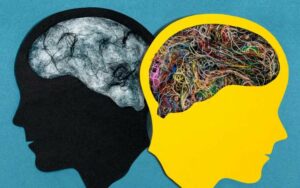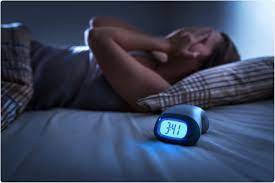Bipolar disorder is a serious mental illness that can often go undiagnosed. It is characterized by extreme mood swings, from manic highs to depressive lows. Many people with bipolar disorder are not even aware that they have it. This is because the early signs of bipolar disorder can be subtle and easy to overlook. In this blog post, we will discuss 10 early signs of bipolar disorder that you should not ignore!
Contents
What Is Bipolar Disorder?
 Bipolar disorder is a mental health condition characterized by extreme mood swings, including periods of mania and depression. These episodes can last for days or weeks at a time, and can significantly impact daily functioning and overall quality of life. This condition is often treated with medication and therapy.
Bipolar disorder is a mental health condition characterized by extreme mood swings, including periods of mania and depression. These episodes can last for days or weeks at a time, and can significantly impact daily functioning and overall quality of life. This condition is often treated with medication and therapy.
While bipolar can develop at any age, the average onset is 25 years old. However, it’s important to be aware of early signs so that you can seek help as soon as possible. Many people might brush off symptoms as “just being moody,” but it’s important to pay attention to any changes in behavior or mood.
All in all, when you are aware of these early signs, you can seek help and start treatment sooner rather than later. It can be difficult to ask for help and admit that something may be wrong, but it is important to prioritize your mental health.
What Are The Early Signs Of Bipolar?
There are a few early warning signs that someone may be experiencing bipolar disorder. These include:
Unusual or excessive talking
This early sign of bipolar is often referred to as “pressured speech.” People experiencing this may talk rapidly and have difficulty stopping or slowing down their speech, even when prompted to do so by others. For example, they may talk nonstop during a conversation or be unable to pause while telling a story.
Racing thoughts
People with bipolar disorder often experience racing or intrusive thoughts, leading to difficulty concentrating and sleeping. These thoughts may include obsessive ideas or fears that are difficult to control. Many people feel like their thoughts are out of their control, leading to distress and anxiety.
Impulsivity or risky behavior
This is often an indicator of mania, where an individual may engage in dangerous activities without thinking about the consequences. These behaviors can range from reckless spending or substance abuse to unsafe sexual encounters. Some common things might include:
- Spending excessive amounts of money
- Engaging in risky behaviors, such as unprotected sex or substance abuse
- Reckless driving or engaging in physical fights
Significant mood swings
A person with bipolar disorder may experience sudden and drastic shifts in mood, often going from feeling extremely happy or high to suddenly feeling depressed or hopeless. This can happen multiple times in a day or over the course of weeks or months. In fact, it can be a defining characteristic of the disorder.
Increased energy, activity, and restlessness
During manic episodes, people with bipolar disorder may have increased energy and engage in risky behavior such as excessive spending or promiscuity. They may also struggle to concentrate and have trouble sleeping. For example, they may go on spending sprees or engage in substance abuse.
Excessive irritability and aggression
Among early signs of bipolar excessive irritability and aggressive behavior can often be present. This may manifest as frequent outbursts or getting into physical altercations. In fact, it can be a symptom that is more commonly seen in bipolar disorder than traditional mood swings.
Changes in sleep patterns
 When anything bad happens, sleep is the first to go. People with bipolar disorder often experience changes in their sleep patterns, such as sleeping very little or excessive sleeping. The reason might be because of mania or depression. For example, during a manic episode, you might not feel the need for sleep and as a result, go days without rest. On the other hand, during a depressive episode, excessive sleeping can occur due to feeling exhausted all the time.
When anything bad happens, sleep is the first to go. People with bipolar disorder often experience changes in their sleep patterns, such as sleeping very little or excessive sleeping. The reason might be because of mania or depression. For example, during a manic episode, you might not feel the need for sleep and as a result, go days without rest. On the other hand, during a depressive episode, excessive sleeping can occur due to feeling exhausted all the time.
Elevated mood or euphoria
This is another early sign of bipolar disorder and is often referred to as a manic episode. During this time, an individual may have excessive energy which leads to risky behavior, excessive spending, and hypersexuality. For example, they may engage in reckless driving or spend large sums of money on unnecessary items.
Guilt and despair
Some people with bipolar disorder may feel intense guilt or despair, even when they haven’t done anything wrong. This can lead to depressive episodes and a sense of worthlessness. For example, if someone with bipolar disorder makes a mistake at work, they may feel an excessive amount of guilt and become depressed.
Self-doubt
Finally, self-doubt can be a big red flag for bipolar disorder. This may manifest as extreme insecurity or second-guessing everything you do, even small decisions. This self-doubt can also lead to problems with decision-making and impulsivity, as well as low self-esteem and difficulties maintaining relationships or holding down a job. If you find yourself constantly questioning your abilities and decisions, it may be time to seek professional help.
So these are a few early signs of bipolar that are important to pay attention to. Remember, bipolar disorder is a treatable mental illness, and the earlier it’s caught and treated, the better chance for a successful outcome. If you or someone you know is exhibiting these symptoms, don’t ignore them – seek help from a mental health professional as soon as possible.
How Can You Prevent It?
If you notice any of the aforementioned symptoms in yourself or a loved one, it is important to seek help from a mental health professional as soon as possible. Bipolar disorder is highly treatable with therapy and medication, but the earlier it is diagnosed and treated, the better chance for successful management of symptoms.
There are a few tips that can help you prevent the onset or worsening of bipolar disorder symptoms. These include:
Maintain sleep schedule
When bipolar hits, sleep can be disrupted, leading to manic or depressive episodes. Maintaining a consistent sleep schedule can help prevent these episodes. As getting enough sleep is important for overall health and well-being, prioritize getting enough shut-eye each night.
Avoid substance abuse
Substance abuse can trigger or worsen bipolar symptoms. It is important to avoid drug and alcohol use in order to maintain mental health stability. Because if substance abuse is left untreated, it can lead to addiction and make managing bipolar disorder even more difficult.
Exercise regularly
 Regular exercise has been shown to improve mood, reduce stress, and even improve symptoms of bipolar disorder. However, someone with bipolar may also experience periods of increased energy and engage in risky or excessive exercise. Pay attention to changes in exercise habits and talk to a healthcare professional if you have any concerns. Also do not go for heavy workouts, just make sure to stay active by going for walks or doing yoga.
Regular exercise has been shown to improve mood, reduce stress, and even improve symptoms of bipolar disorder. However, someone with bipolar may also experience periods of increased energy and engage in risky or excessive exercise. Pay attention to changes in exercise habits and talk to a healthcare professional if you have any concerns. Also do not go for heavy workouts, just make sure to stay active by going for walks or doing yoga.
Develop healthy coping mechanisms
When you see early signs of bipolar, you should also start developing healthy coping mechanisms. This will help you in the long-term management of your bipolar symptoms. Some examples include:
- Choosing another hobby
- Creating a routine
- Eating healthily
- Practicing meditation and deep breathing
These things may seem small, but they can have a big impact on your mood and overall well-being. It’s important to take care of yourself and seek help as soon as possible.
Talk to your loved ones
When you notice any of the early signs mentioned above, it’s important to talk to your loved ones about them. They may have noticed changes in your behavior that you didn’t realize, and their input can be valuable in determining if further evaluation is necessary. When you share your concerns with them, it’s also important to let them know that bipolar disorder is a treatable condition and that seeking help is nothing to be ashamed of.
See a therapist
It is important to seek professional help if you notice any of the signs mentioned above. A therapist can provide an accurate diagnosis and create a treatment plan that works for you. Remember, bipolar disorder is a treatable condition. With the right support and management, you can live a fulfilling and balanced life.
Keep a journal
A journal in the initial stages can help track mood swings and patterns. It can also assist a doctor in making an accurate diagnosis. For example, if a journal entry shows feeling excessively happy and energetic for several days followed by severe depression, it could indicate bipolar disorder. So, you can see the value in keeping a record of your thoughts and emotions.
Join a support group
 Many people with bipolar disorder find support groups to be valuable resources. Not only can they provide emotional support, but they can also offer practical tips for managing symptoms and maintaining overall wellness. It can also be helpful to have a network of peers who understand the unique challenges of living with bipolar disorder.
Many people with bipolar disorder find support groups to be valuable resources. Not only can they provide emotional support, but they can also offer practical tips for managing symptoms and maintaining overall wellness. It can also be helpful to have a network of peers who understand the unique challenges of living with bipolar disorder.
All in all, these are a few tips that can help you to identify early signs of bipolar disorder. Remember, seeking professional help as soon as possible is crucial for effectively managing the illness and improving quality of life. If you or someone you know is experiencing any of these symptoms, don’t hesitate to reach out for assistance. Your well-being is worth it.
Conclusion
To conclude, early signs of bipolar disorder may not always be easy to spot, but it’s important to pay attention to any changes in mood or behavior that could indicate a potential issue. If you notice yourself or someone close to you exhibiting any of the signs listed above, don’t ignore them and reach out for help from a mental health professional.
Take care of yourselves, friends! And always remember that you are not alone in this journey. Seek support and help whenever needed. You deserve to live a fulfilling and happy life.
If you’re still having issues understanding things, please contact Therapy Mantra for help and guidance. The team of experts will be more than happy to help you out. Contact us today to learn more about our services. You can also book an online therapy session or download our free Android or iOS app.


